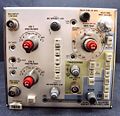7S14: Difference between revisions
No edit summary |
No edit summary |
||
| Line 1: | Line 1: | ||
7S14 is a dual-trace delayed sweep sampler plug-in. | 7S14 is a 1GHz dual-trace delayed sweep sampler plug-in. | ||
It is a complete sampling system unlike, for example, the [[7S12]], | |||
which requires a separate timing plug-in to provide triggering | |||
and sampling pulse generation. | |||
The 7S12 contains two samplers, trigger and sweep circuitry, | |||
and and circuitry to interface it with the 7000-series mainframe it which it operates. | |||
The mainframe provides the 7S14 with power. | |||
The 7S14 sends the mainframe horizontal, vertical, and readout signals. | |||
There are two 1.35V mercury button cells, BT1 and BT2, in the sampler circuit. | |||
They acting as floating bias sources, so if a 7S14 stops working it may be not defective, | |||
just dead batteries. First check the voltage on the cells. | |||
When the mercury cells die, you can replace them with other (less toxic) | |||
methods of bias voltage generation. Two obvious solutions are photovoltaic | |||
cells or modern batteries. The 7S14 bias cell issue has been discussed extensively | |||
on the Yahoo TekScopes forum, so search the archives there for more information. | |||
The 7S14 has an integrated delay measurement function. | |||
*Risetime = 350 ps (This means 1 GHz bandwidth) | *Risetime = 350 ps (This means 1 GHz bandwidth) | ||
| Line 8: | Line 23: | ||
*delayed timebase | *delayed timebase | ||
*50 ohms input | *50 ohms input | ||
*allowed input voltage range is 5Vpk | |||
The 7S14 uses tunnel diode triggering and a two-diode sampler for each channel. | The 7S14 uses tunnel diode triggering and a two-diode sampler for each channel. | ||
Revision as of 10:10, 20 March 2011
7S14 is a 1GHz dual-trace delayed sweep sampler plug-in. It is a complete sampling system unlike, for example, the 7S12, which requires a separate timing plug-in to provide triggering and sampling pulse generation. The 7S12 contains two samplers, trigger and sweep circuitry, and and circuitry to interface it with the 7000-series mainframe it which it operates. The mainframe provides the 7S14 with power. The 7S14 sends the mainframe horizontal, vertical, and readout signals.
There are two 1.35V mercury button cells, BT1 and BT2, in the sampler circuit. They acting as floating bias sources, so if a 7S14 stops working it may be not defective, just dead batteries. First check the voltage on the cells. When the mercury cells die, you can replace them with other (less toxic) methods of bias voltage generation. Two obvious solutions are photovoltaic cells or modern batteries. The 7S14 bias cell issue has been discussed extensively on the Yahoo TekScopes forum, so search the archives there for more information.
The 7S14 has an integrated delay measurement function.
- Risetime = 350 ps (This means 1 GHz bandwidth)
- Vertical deflection 2mV/DIV to 0.5V/DIV in 1,2,5 sequence
- Time base deflection factor 100 µs/DIV to 100 ps/DIV in 1,2,5 sequence
- delayed timebase
- 50 ohms input
- allowed input voltage range is 5Vpk
The 7S14 uses tunnel diode triggering and a two-diode sampler for each channel.
-
7S14 front
-
Sampler schematic
-
Trigger schematic


